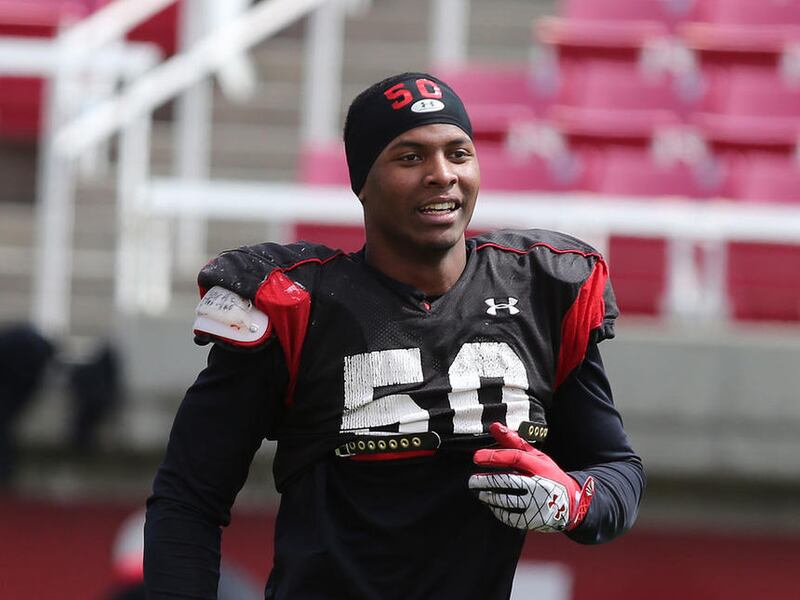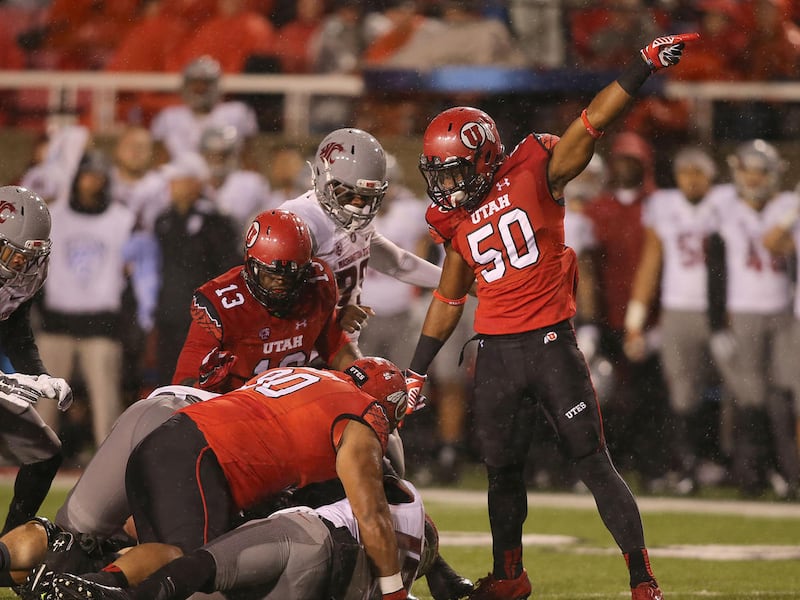I am glad I was raised in Tonga. It’s like special. Not that many people who get that opportunity and then get to live here go to one year of high school and straight to (Division 1) football. – Utah DE Pita Taumoepenu
SALT LAKE CITY — On long walks from school to the family farm, Pita Taumoepenu listened to his grandfather tell him how his future included playing a game he didn’t know in a country he couldn’t remember.
“Growing up in Tonga, my grandparents tell me, ‘One day, you’re going to be a football player,’” said the Utah defensive end. “I said, ‘What is football?’ I didn’t know football. I played Rugby. … I used to walk with my grandfather to the farm every day after school. I tell him, ‘Stop telling me this. We’re on a farm. This is what I’m going to do when I grow up.’”
But Taumoepenu’s grandparents were right.
Not only did their grandson end up playing football in the country he left as an infant, the sport would help him earn a college education.
*
Taumoepenu was just 6 months old when his grandparents — Pita and Meleseini Taumoepenu — took him and his older sister, Ruth Tuha, to live in Tonga.
Born in Texas, Taumoepenu’s mom, Kava Tuha, named him after her father.
“I’m half Tongan, half black, and my mom wanted me to learn our culture,” he said. “So I moved to Tonga with my grandparents when I was a baby.”
His older sister said the move was different because she remembered their life in the U.S. while Pita did not.
“Growing up on the island, we both grew up on the farm,” she said. “We were so close to our grandfather. … Our routine was to go to school Monday through Friday and then spend all day Saturday at the farm. We’d go to church on Sunday. Sometimes on Monday and Wednesday, too.” Taumoepenu said he loved living in Tonga where he was surrounded by extended family.
“I have one sister and a couple hundred cousins,” he said laughing.
Tuha laughed at her brother’s description of their family.
“That is very, very true,” she said. “We have more than 200 cousins and probably hundreds of uncles and aunts. It’s hard to keep track.”
She said people they didn’t know would recognize their surname and “start telling us stories about our family.”
They do not have contact with their father, but both of them said their grandfather and uncles have helped raise them.
Taumoepenu belly laughs as he tries to describe how his aunts and uncles have become his surrogate parents at different times.
Finally, he finds a way to convey what it’s like.
“After games, my phone is popping from my aunts and uncles,” he said. “It motivates me to keep working hard, to try to make plays.”
*
Taumoepenu said his mom made the decision for him to come back to the states when he was 17. His mom, sister and grandparents moved to Monteray, California, but he moved to Utah where he lived with an aunt and attended Timpview High.
He said the adjustment was difficult.
“It was a shock,” said Taumoepenu, who is majoring in economics and sociology. “It was very different. … It was super hard, the language. I was really good at math so that helped my ACT scores.”
It was his cousins who persuaded him to try the sport his grandfather told him about when he was just a child.
The gregarious junior said he enjoyed it right away, but he admits his coaches simplified his duties.
“My coach just told me to go get the quarterback,” he said laughing loudly. “That’s all I cared about. That’s all I do, and it was fun.”
He was so good at it, he finished with 25 sacks in 2012, the third highest single-season total in state history. He also earned 68 tackles and first-team all-state honors, as well as USA Today’s All-Utah Team.
He helped the T-birds to the state title in his only high school season, but the joy of winning a championship was muted by the loss of the grandfather for whom he is named.
“I was so sad,” he said. “I felt so bad. I was planning on calling him after the game to tell him, ‘You were right. I made it!’ But I didn’t get a chance to tell him that. He passed away the night before the championship game.” Taumoepenu said he believes his grandfather is with him in spirit and he thinks of the lessons he taught him long ago.
“He’s one of the things that helps me work hard,” he said. “I am glad I was raised in Tonga. It’s like special. Not that many people who get that opportunity and then get to live here go to one year of high school and straight to (Division 1) football.”
*
Adjusting to the college game was another shock to Taumoepenu.
“College was super hard,” he said. “The plays were hard to learn; they have a lot of plays. It’s a different level, and it was hard for me to catch up.”
In high school, he relied on will, grit and athleticism. In college, he has had to learn to read an offense, a skill he said he’s still trying to develop.
“People in college were a lot bigger and faster,” he said, his infectious laugh bellowing through the practice facility again. “It’s good right now. I work with (assistant coach) Sione Po’uha. He always looks out for me, works with me.”
Po’uha, who is also Tongan, has become another uncle to Taumoepenu, even offering him instructions and encouragement in his native tongue.
“My freshman year I didn’t know the plays,” he said. “My sophomore year, I knew the plays but I needed experience. Sometimes I get out there, I get too excited.”
He looked to former Utes Nate Orchard, who plays for the Cleveland Browns, and Trevor Reilly, who now plays for the New York Jets, to help him learn technique and strategy.
“They helped me a lot,” he said, describing how he’d watch Orchard work and then ask him questions about why he did what he did. “I just watch, and he break it down for me.”
Utah head coach Kyle Whittingham said Taumoepenu has worked hard to develop his skills in his first two season, although he said he needs to gain some weight and improve against the run.
Taumoepenu found himself in the spotlight after the Utah State game when he sacked quarterback Chuckie Keeton, causing him to fumble the ball.
“That was the play of the game,” Whittingham said on his weekly radio show on ESPN 700 Radio. “It really turned the momentum back in our favor to stay. … He had very little football experience when we got him, but he’s progressed every year. He’s going to be a weapon for us the rest of this year, especially in passing situations.”
Taumoepenu said he loves football, especially when it’s all about hunting down a quarterback. Orchard told ESPN’s Bill Riley that he believes if Taumoepenu continues to progress, he could break Orchard’s sack record of 18.5 sacks in a season.
Both he and his sister admit surprise at the level of his success.
“He’s very quiet and humble,” Ruth said. “It did surprise me and most of our family. My grandma, not so much. She (like their grandfather) said, he will grow up to be athletic. She had faith in him. But he’s had so little time to learn to get to where he is.” She said his success on the football field inspires her in her life.
“I am very proud,” she said. “I am a happy sister. Before he moved back, I was just a wild animal. He was the good kid, and he moved back, we started hanging out. And then just seeing him, watching him get to where he’s at, it makes me very happy. It makes me look at life very differently. It’s not all about partying. I’m very happy for him.”
Email: adonaldson@deseretnews.com
Twitter: adonsports



